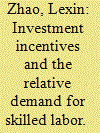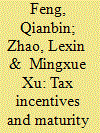|
|
|
Sort Order |
|
|
|
Items / Page
|
|
|
|
|
|
|
| Srl | Item |
| 1 |
ID:
092848


|
|
|
|
|
| Publication |
2009.
|
| Summary/Abstract |
Climate change is one of the most significant challenges faced by societies this century. Energy consumption is directly associated with CO2 emissions and climate change. The European Commission has set out emission reduction targets that require a great deal of energy consumption savings in the next 10 years in European countries. This paper presents the results of an analysis of the potential cost-effectiveness of different policy options aimed to foster the production and consumption of energy-efficient appliances in different European countries. Our results suggest that incentives to promote the use of energy-efficient appliances can be cost-effective, but whether or not they are depends on the particular country and the options under consideration. From the cases considered, tax credits on boilers appear to be a cost-effective option in Denmark and Italy, while subsidies on CFLi bulbs in France and Poland are cost-effective in terms of €/ton of CO2 abated. Comparing the subsidies against the energy tax options, we find that the subsidies are in most cases less cost-effective than the energy tax.
|
|
|
|
|
|
|
|
|
|
|
|
|
|
|
|
| 2 |
ID:
128446


|
|
|
|
|
| Publication |
2014.
|
| Summary/Abstract |
This paper evaluates the effects of a property tax bonus to promote the installation of solar-thermal energy systems in buildings in Andalusia (southern Spain). The propensity score matching methodology is used. The treatment group consists of municipalities of Andalusia that established property tax bonuses in their municipalities in 2010. The control group consists of municipalities that did not. The response variable measures the number of new square meters of solar thermal systems installed in 2010. The analysis leads to the conclusion that municipalities that established a property tax bonus had installed, on average, 102.245 to 122.389 square meters more. These results indicate that the percentage increase in squares meters installed in municipalities which adopted the tax bonus promotion ranged from 70.74% to 98.38%. These percentages were lower for rural municipalities (49.00% to 77.06%).
|
|
|
|
|
|
|
|
|
|
|
|
|
|
|
|
| 3 |
ID:
187858


|
|
|
|
|
| Summary/Abstract |
This study evaluates the effects of China's 2014 and 2015 accelerated depreciation policies on the relative demand of firms for skilled labor. We develop a simple model to explore how the policies affect the relative demand of firms for skilled labor and illustrate the roles of financing constraints and tax compliance in mediating the policy effects. We then employ a firm-level dataset from China's A-share listed companies and use a quasi-experimental design to examine the model predictions. We find that the policies significantly increase the relative demand of firms for skilled labor. The channels underlying the policy effects are that the policies generate additional cash flow for firms, stimulate investment and, thus, raise the demand of firms for skilled labor with the presence of capital–skill complementarity. We also find that the positive effects of the policies on the relative demand for skilled labor are primarily significant for firms with strong financing constraints and high tax compliance. Moreover, we document the positive effects of the policies on R&D investment, firm value added, productivity, workers' benefits, and corporate social responsibility performance, which further corroborate our main results.
|
|
|
|
|
|
|
|
|
|
|
|
|
|
|
|
| 4 |
ID:
192998


|
|
|
|
|
| Summary/Abstract |
This paper examines the effects of China's accelerated depreciation policy (ADP) on the maturity mismatch between investment and financing. Using panel data for China's A-share nonfinancial listed companies from 2010 to 2019 and a staggered difference-in-differences approach, we found the following. First, ADP significantly aggravated the degree of corporate maturity mismatch, and this result was robust across multiple checks. Second, due to an insufficient long-term loan supply, firms had to finance the fixed investments induced by ADP with short-term debts, leading to maturity mismatches. Third, the positive policy effects were mainly significant for firms with high policy exposure, high-risk preferences, a high degree of information asymmetry, and firms with weak long-term financing capacity. Finally, maturity mismatch exacerbated corporate financial risks. Our research findings indicate that passive maturity mismatch is prevalent among Chinese companies and emphasize the need to address financial repression in order to mitigate the potential financial risks that may arise from tax incentives.
|
|
|
|
|
|
|
|
|
|
|
|
|
|
|
|
| 5 |
ID:
166437


|
|
|
|
|
| Summary/Abstract |
This paper analyzes the tax incentives and aids adopted in the taxes and environmental policies to improve the energy efficiency of Spanish households. The established environmental policy presents advances although with incipient results, since the energy efficiency of the houses still plays a secondary role. In the area of taxes, no tax incentives have been effective in reducing the investment in improvements in the energy efficiency of homes, especially in those of old construction. Our conclusions indicate the convenience of promoting the energy efficiency of homes through the fiscal route. In this sense, it proposes incorporating an incentive to the Personal Income Tax linked to improved energy rating of housing. Also, it raises the improvements in the current regulations on tax benefits on the Real Estate Tax and on the Tax on Building, Installations and Infrastructural Work. These are two of the main features of this paper.
|
|
|
|
|
|
|
|
|
|
|
|
|
|
|
|
|
|
|
|
|